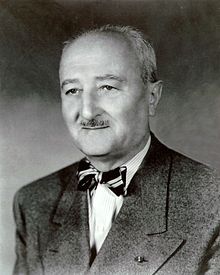William F. Friedman
| William F. Friedman | |
|---|---|
 |
|
| Born |
Wolf Friedman September 24, 1891 Kishinev, Bessarabia Governorate |
| Died | November 12, 1969 (aged 78) Washington, D.C. |
| Nationality | United States |
| Engineering career | |
| Significant advance | cryptologist |
William Frederick Friedman (September 24, 1891 – November 12, 1969) was a US Army cryptographer who ran the research division of the Army's Signal Intelligence Service (SIS) in the 1930s, and parts of its follow-on services into the 1950s. In 1940, subordinates of his led by Frank Rowlett broke Japan's PURPLE cipher, thus disclosing Japanese diplomatic secrets before America's entrance into World War II.
Friedman was born Wolf Friedman (Yiddish: װאָלףֿ פֿרידמאַן, Russian: Вольф Ф. Фридман), in Kishinev, Bessarabia, the son of Frederick Friedman, a Jew from Bucharest who worked as a translator and linguist for the Russian Postal Service, and the daughter of a well-to-do wine merchant. Friedman's family fled Russia in 1892 to escape the virulent anti-Semitism there, ending up in Pittsburgh, Pennsylvania. Three years later, his first name was changed to William.
As a child, Friedman was introduced to cryptography in the short story "The Gold-Bug" by Edgar Allan Poe. He studied at the Michigan Agricultural College (known today as Michigan State University) in East Lansing and received a scholarship to work on genetics at Cornell University. Meanwhile, George Fabyan, who ran a private research laboratory to study any personally interesting project, decided to set up his own genetics project and was referred to Friedman. Friedman joined Fabyan's Riverbank Laboratories outside Chicago in September 1915. As head of the Department of Genetics, one of the projects he ran studied the effects of moonlight on crop growth, and so he experimented with the planting of wheat during various phases of the moon.
...
Wikipedia
